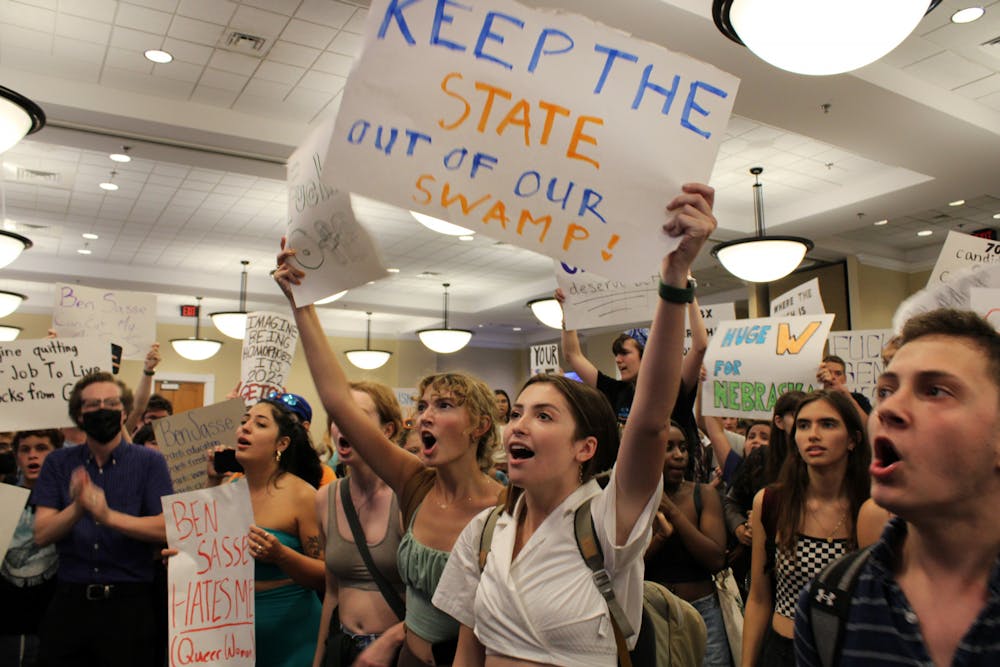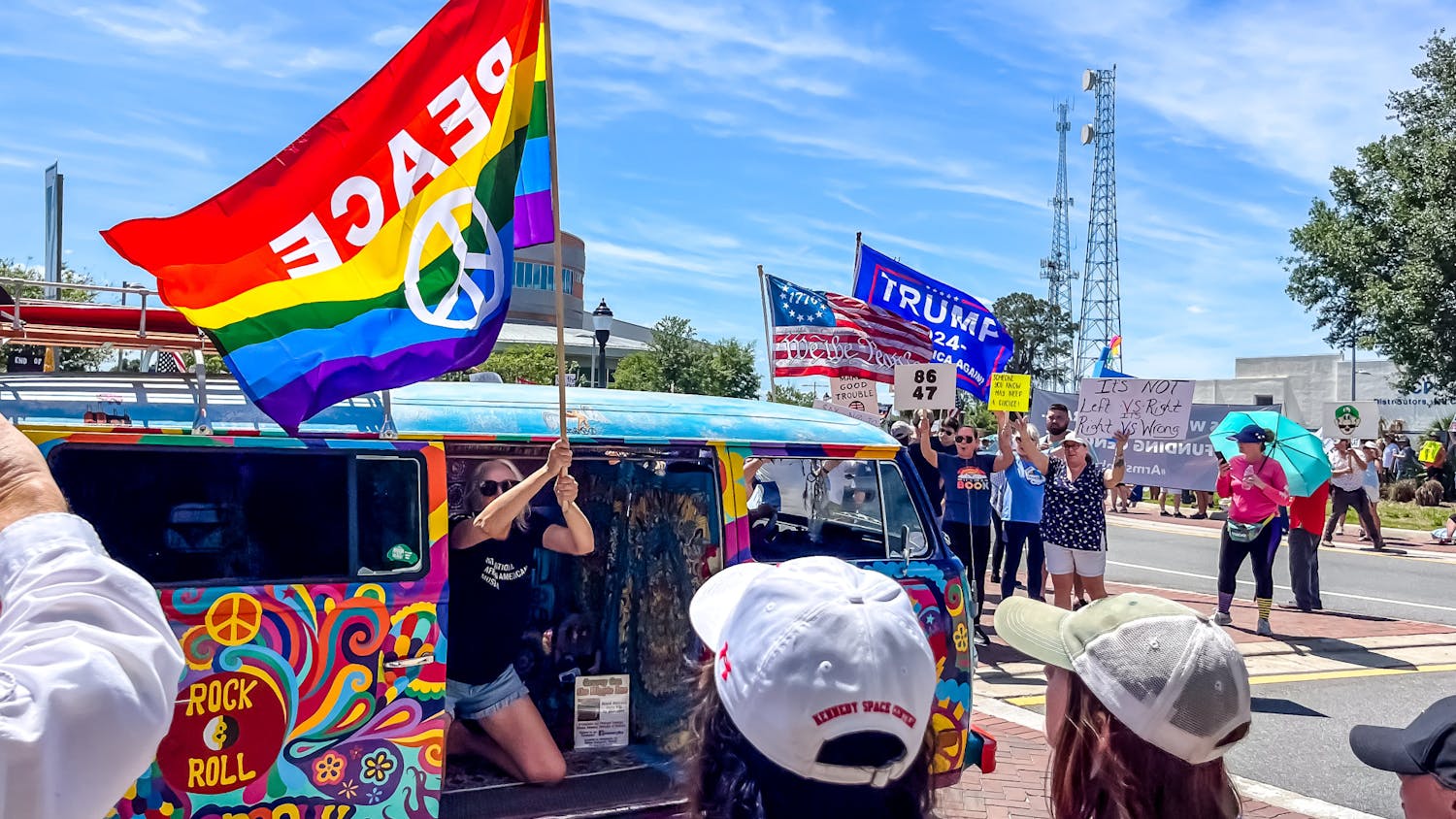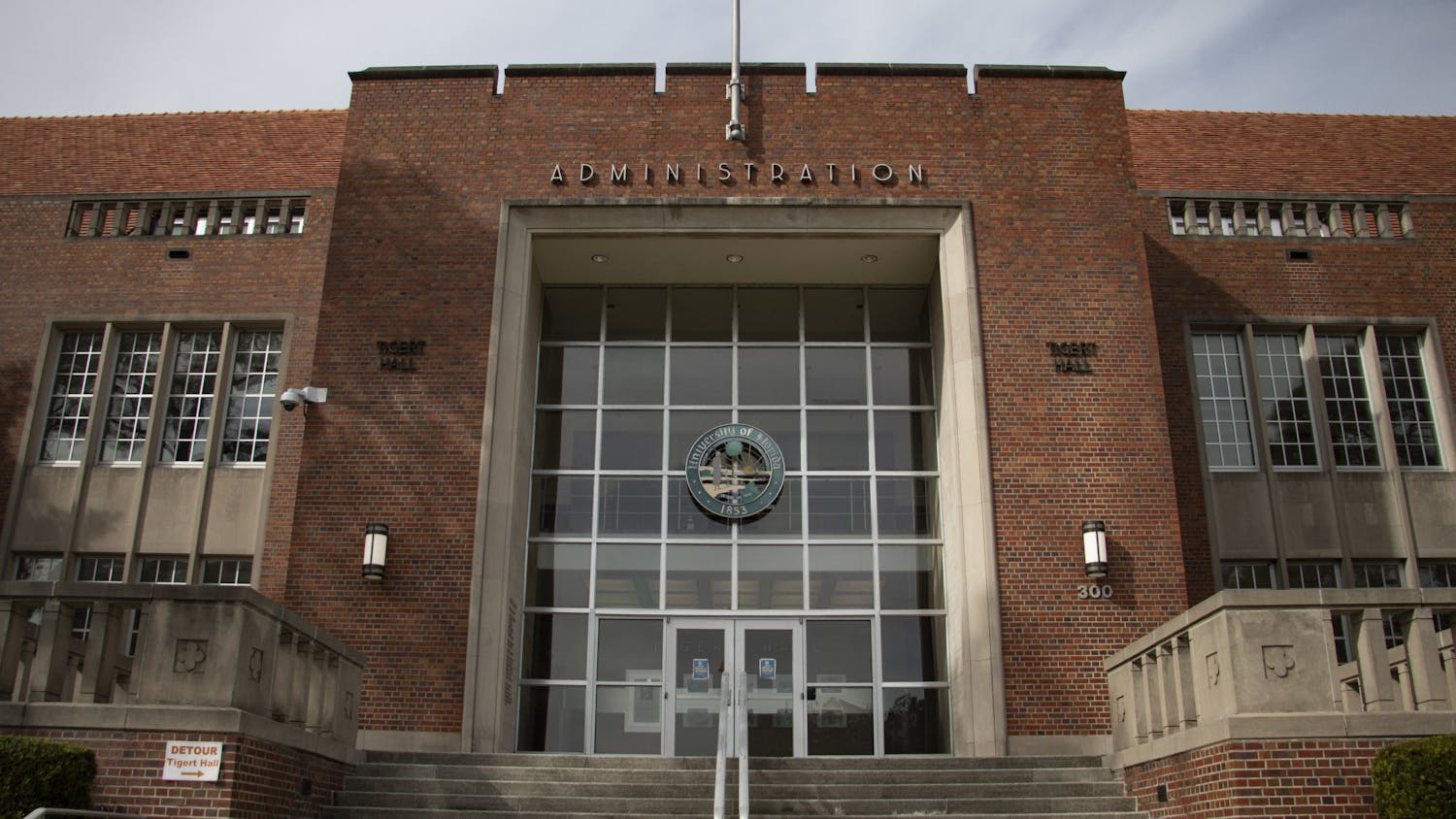UF President Kent Fuchs saw the images of about 300 students storming Sen. Ben Sasse’s student forum Oct.10 and was reminded of the Capitol insurrection on Jan. 6, 2021, he said.
“It just was not a look that I thought was what we should have as a university,” Fuchs told The Alligator.
In a university-wide email Oct. 24, Fuchs announced UF would crack down on student protestors for presidential finalist Ben Sasse’s upcoming visit. Students may be punished by the university under the Student Conduct Code if they protest inside Emerson Alumni Hall during Sasse’s second visit Nov. 1.
Fuchs didn’t know what this punishment would entail.
However, the regulation is at least two decades old, Fuchs wrote in his email. But the policy hasn’t been enforced in recent years.
The regulation of student protests inside university buildings was enacted on campus in 1969, according to UF library records of a student handbook. The regulation came from a resolution that students’ non-compliance with on-campus regulations could result in arrest by campus police or outside law enforcement.
In 1968, however, a resolution sponsored by UF professor John Greeman called for the administration to use any and all available resources to quell student disruptions — even university disciplinary action.
Greeman’s resolution was never enacted at the time, but the regulation was later amended to add that protesters could also be subject to academic punishments.
The policy wasn’t enforced Oct. 10, when around 300 protestors stormed Emerson Hall during one of Sasse’s open forums. UF spokesperson Cynthia Roldan didn’t give an answer when asked in an email why this regulation wasn’t enforced then.
Many UF students still plan to protest outside of Emerson Alumni Hall during Sasse’s interview with the Board of Trustees.
Joshua Zeffren, a 19-year-old UF chemical engineering freshman, said he protested Sasse’s forums because he wanted to make it clear that Sasse isn’t wanted on campus.
Zeffren still plans to protest outside of Emerson Hall once again for Sasse’s next visit, he said.
“Fuchs’ statement that the restriction is in the name of free speech is nothing but pure hypocrisy,” Zeffren said.
But students aren’t the only ones who had negative reactions to the email. Steven Noll, a UF history professor, witnessed administration react to on-campus demonstrations over the years. Noll believes the email is a veiled threat to students, he said.
“I think this verified to many students and faculty that the administration is only paying lip service to the ideas of free speech,” Noll said.
In 2019, UF released a Freedom of Expression Statement stating it will protect students’ First Amendment rights, as long as students express their opinions in a civil matter. UF considers outdoor areas on campus traditional public forums, where students can hold demonstrations so long as it doesn’t disrupt the functions of the university, according to the statement.
Fuchs’ email also comes after UF’s decades-old history of students who faced punishment or discouragement from exercising their right to free speech on campus.
In 2017, Richard Spencer, an American neo-Nazi and antisemitic conspiracy theorist, spoke at an event on campus that wasn’t sponsored by UF. Many students planned to protest at the event, even after Fuchs sent an email urging students to not attend for their own safety.
“I urge everyone to stay away from Mr. Spencer and his followers and the Phillips Center where he will speak,” Fuchs wrote at the time.
Some students felt even more encouraged to protest after Fuchs’ email.
Megan Newsome, a 2017 UF alumna, protested Richard Spencer’s visit to campus during her time as a UF student.
“Similar emails were sent then, begging us not to protest,” Newsome said. “Not only did it not stop us, I think it only riled us up more.”
Newsome felt insulted by Fuchs’ decision to prevent students from protesting Sasse’s second visit, she said.
“To act as if these students aren’t making a difference but are only getting in the way, that feels incredibly short-sighted to what the purpose of protesting is,” Newsome said.
In 2007, Andrew Meyer, a 2008 UF alumnus, was tasered and arrested by the University Police Department at a student forum for former Sen. John Kerry, D-Mass.
Meyer grabbed a microphone and began shouting questions during the end of the forum. Officers attempted to escort Meyer out, but he broke away. Kerry insisted he ask his questions, so Meyer was given the opportunity to speak.
Meyer asked Kerry about his involvement in Skull and Bones society and used the term “blowjob” causing his microphone to be cut off and two UPD attempts to escort him out of the forum. Meyer attempted to escape while more officers aided in his escort. One officer pointed a taser at him prompting him to yell out, “Don’t tase me, bro.” An officer tased him in the shoulder.
This incident led UF students to lead a protest against police brutality on campus. It also started a free speech debate across the nation. Howard Simon, director of the Florida chapter of the American Civil Liberties Union released a statement about the incident.
“People have a reasonable expectation to ask questions in a public setting — even if they are aggressive and some disagree with their position — that is, free speech plain and simple,” Simon said at the time.
One of the most notable on-campus protests occurred April 15, 1971, a day that would become later known as “Black Thursday.”
Seventy students marched into former President Stephen O’Connell’s office in Tigert Hall uninvited with a list of demands to address the lack of Black faculty and students at UF. Students were asked to leave the office after attempting a sit-in earlier. After the group of protesters refused to leave for a second time, police began to arrest students. The sit-in protest grew to 1,500 participants who were attacked with tear gas.
The most prominent example of UF enforcing the on-campus demonstration regulation is “Black Thursday,” Noll said.
The UF student body president at the time of the protest, Steven Uhlfelder, attended the protest and spoke out against O’Connell. The UF alumnus was on the Florida Board of Regents serving as the governing body for the State University System of Florida before being replaced by the Florida Board of Governors, which he also sat on.
“I understand both perspectives having been a part of the protests and also being a policy maker for the university system,” Uhlfelder said.
Uhlfelder believes protests have a very meaningful role on campus, he said, but thinks there should be decorum in meetings.
“Meetings should be able to function efficiently and properly,” Uhlfelder said. “So I don’t see any wrong with what he’s [Fuchs] done.”
The “Black Thursday” protests resulted in 66 Black students arrested and suspended and 123 Black students withdrawing from the university.
Mirroring previous UF students, current students prepare to protest outside of Emerson Alumni Hall for Sasse’s next arrival despite the looming presence of discipline from the university.
Contact Claire at cgrunewald@alligator.org. Follow her on Twitter @grunewaldclaire.

Claire Grunewald is a fourth-year journalism major and the Spring 2024 Editor In Chief of The Alligator. In her free time, she likes to go to concerts and attempt to meet her Goodreads reading goal.






